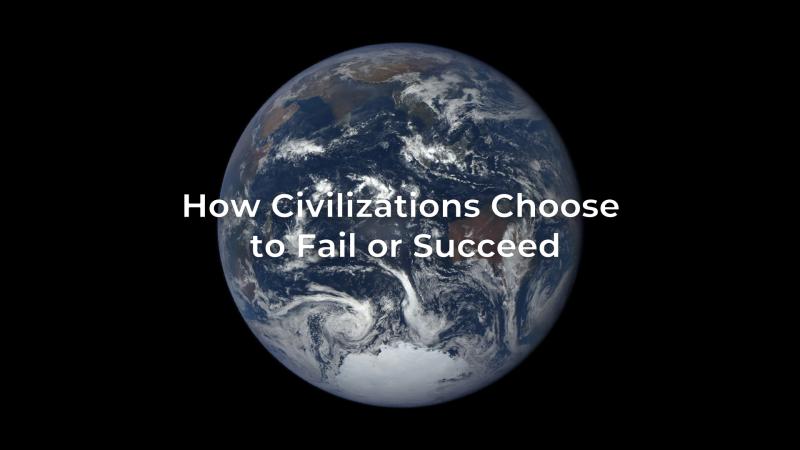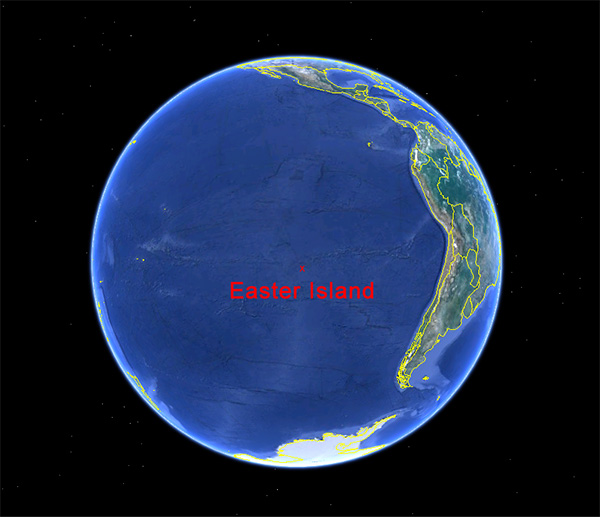
How Civilizations Choose to Fail or Succeed
Arthur Woods / Jun 1, 2013
Space
noun
1. the unlimited or incalculably great three-dimensional realm or expanse in which all material objects are located and all events occur.
2. beyond the atmosphere of the earth.
Option
noun
1. the act or an instance of choosing or deciding
2. the power or liberty to choose
3. something that may be or is chosen; choice.
In his book Collapse – How Societies Choose to Fail or Succeed, Jared Diamond, a geologist, examines a number of ancient societies that have collapsed including, among others, Easter Island, the Mayan culture and the Norse settlements in Greenland. He then turns his focus towards the present and future by examining societal catastrophes such as what happened in Rwanda and then he looks at modern societies like China and Australia, whose futures may be mortgaged by environmental degradation and/or overpopulation.
What particularly struck me about the title of the book was the word “choose” in its subtitle: i.e.
“how societies choose to fail of succeed”.
Put into a global and contemporary context , we can take Diamond’s subtitle to the next level: “how civilizations choose to fail of succeed”.
Thus, our concept The Space Option, implies that a choice related to space exists for humanity that has much to do with the success of our civilization and some decision to that effect could or should be made. In other publications we have focused this choice scenario in the following expression:
Our future – will it be a Space Age or a Stone Age?
Malcolm Gladwell of the New Yorker Book Review had this to say about “Collapse” (1):
“We live in an era preoccupied with the way that ideology and culture and politics and economics help shape the course of history. But Diamond isn’t particularly interested in any of those things—or, at least, he’s interested in them only insofar as they bear on what to him is the far more important question, which is a society’s relationship to its climate and geography and resources and neighbors.
“Collapse” is a book about the most prosaic elements of the earth’s ecosystem—soil, trees, and water—because societies fail, in Diamond’s view, when they mismanage those environmental factors.
Diamond makes a distinction between social and biological survival because too often we blur the two, or assume that biological survival is contingent on the strength of our civilizational values. The fact is, though, that we can be law-abiding and peace-loving and tolerant and inventive and committed to freedom and true to our own values and still behave in ways that are biologically suicidal.”
I believe the mysterious story of Easter Island has particular significance for The Space Option.
Easter Island, an isolated island in the South Pacific, once had an abundant amount of natural resources, it had dozens of species of trees which created and protected an ecosystem fertile enough to support a thriving culture of over 30,000 inhabitants and one that produced enormous stone statutes. This society was not murdered or wiped-out by invasion, it was not decimated by a pest or by another natural catastrophe. Their collapse appears to have been caused primarily by deforestation attributed to political and social causes such as competition among the chiefs to erect larger statues which required a large number of trees to move the statues from the building site to the erection place. Larger statues gave them a higher rank and over time the Eastern Islanders cut down each and all of their trees one-by-one. This didn’t happen overnight. Any Eastern Islander who tried to warn about the dangers of progressive deforestation would have been overridden by vested interests of the stone carvers, the bureaucrats, and the chiefs, whose jobs depended on continued deforestation. In the end, they committed suicide. They no longer had the one resource – trees – necessary for building fishing boats and for their only means of escape.
When Diamond gives this lecture his students ask the obvious question: “How on earth could such a society make the disastrous decision to cut down all of the trees on which it depended?” Diamond, too, asks himself: “What was the person thinking when he cut down the last tree?” as he points out that the destruction of the trees was made by rational people who must have been aware of the importance of trees to their survival (2, 3).

Easter Island's loction in the Pacific Ocean. Source: Google Maps
The fact that Easter Island was also quite isolated in the South Pacific made the possibility of emigration to another locality very difficult. Easter Island is located 2000 km from the coast of Chile and 1400 km from the nearest inhabited island to the west.
Easter Island is as alone in the Pacific Ocean much as our planet Earth is alone in space. If we compare the geographical situation of Easter Island to the cosmological situation of planet Earth then an insight emerges that may have relevance to the survival of our own civilization.
Today, our modern societies have developed quite a complex infrastructure to deal with changes in the global system in order to regulate the economy, manage resources, respond to threats to national security, etc. Yet there is also the inherent problem that group dynamics which characterize our decision making processes are not always effective and often fail because of competing interest groups and competing priorities.
The systemic failures of the world community to manage major problems are numerous; how our governments responded to Hurricane Katrina both before and after the storm, the Gulf oil spill, Fukushima and the current financial crises are examples of how such modern systems can and do fail.
We must ask ourselves the following: “Why do our governments continue to invest vast resources into the technologies of destruction rather in the technologies that promote survival, peace and prosperity?” We have a moral and philosophical dilemma here. Either, we are more afraid of each other than we are of the real threats to our existence or maybe it is embedded in our character to live in a state of denial.
Diamond has a lot more to stay about lessons we could learn by examining what happened to these failed societies and says that although we have many more creative people alive today and vast technological resources and stores of information that the ancients didn’t have and with these we can possibly invent environmentally friendly technologies as needed to meet our challenges. However, he soberly points out the impact of our powerful technology on the environment – from heavy metal bulldozers to nuclear power – may actually increase rather than decrease the risks inherent in our global society. As we have pointed out in other articles, since their invention, space technologies may be used to end our history on Earth or to begin our history through the cosmos.
Thus, The Space Option is an opportune choice that offers humanity a large and significant number of benefits which will not be available to us if this option is not taken, such as:
- To begin importing the infinite (for human purposes) wealth of the universe instead of depleting and fighting over the finite wealth of our planet’s resources – this would lead to a high standard of living for all people. Easier access to plentiful resources which then become cheaper makes it correspondingly easier for anybody to satisfy their needs leading to prosperity.
- The means to solve many of our environmental problems e.g. clean energy, infinite resources, pollution avoidance via off planet industrialization and processing.
- An activity that would allow humanity to re-focus the assertive, exploratory energies that are so characteristic of human beings which are currently heavily invested in the military-industrial complex.
- A global project that could inspire, excite and unite all the people in the world to work together for our mutual benefit and future survival leading to a real chance for peace, prosperity and hope for future generations
- The ultimate survival of all life – not just humanity - beyond the borders of our fragile planet.
Like us today, the inhabitants of Easter Island, had an “option” - they had a choice to make about their customs, their practices and their resources that could have likely led to a different and more positive future for their society. They obviously didn’t make the right choice and, as they were too isolated, escape from their island became impossible.
Humanity is on the threshold of its future. It is our Cosmic Choice that we must make. It is not too late to embrace The Space Option. However, time may no longer be on our side.
References:
- Jared Diamond, “Collapse – How Societies Choose to Fail or Succeed”, Viking Penguin Books (2005), USA
Amazon
- Jared Diamond, Easter Island’s End, in Discover Magazine. August 1995,
http://www.hartford-hwp.com/archives/24/042.html
- Malcom Gladwell: THE VANISHING: In “Collapse,” Jared Diamond shows how societies destroy themselves. New Yorker Magazine, Issue of 2005-01-03, Posted 2004-12-27 http://www.newyorker.com/critics/books/articles/050103crbo_books?050103crbo_books
- This article is a slightly edited excerpt from my paper: Space Options for the 21st Century Overview and Perspective, presented at the 2nd International Academy of Astronautics Symposium on the Impact of Space and Society, ESTEC, Noordwijk, NL, 27 February – 1 March, 2007
